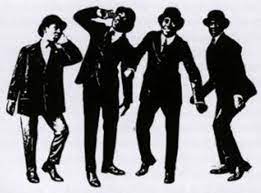Introduction
Jubliee Quartet was established in the 1870s to raise money for black colleges that were struggling finchially. After the Fisk Jubilee Singers’ first national tour in 1871, the spiritual genre saw an increase in popularity. As a result, male quartets were formed to sing simultaneously in a variety of settings. Later, they took over for other travelling choirs whose expenses had started to outpace their revenue. Jubilee quartets, the first of which was the Fisk Jubilee Quartet from Fisk University, sang spirituals in acappella arrangements while touring and independently recording.

Thesis Statement
The Jubilee Quartet was a quartet of African men that performed together. This definition falls short of conveying the true significance of this innovative genre. The Jubilee Quartet demonstrated their talent and versatility by singing in three different musical eras and genres.
Evolution of the Quartets

The monetization of quartets eventually gave rise to touring, radio broadcasting, and the crossover phenomenon. The quartet helped secular and religious music develop in the 20th century and developed into a subgenre of gospel music.
The 1940s saw the beginning of quartet competitions, sometimes known as song fights. These competitions served three purposes: to define and legitimize black cultural aesthetics and values; to develop and uphold high standards of quartet musical performance; and, finally, to offer a venue for exchanging collective expressive behavior in the community. Churches, high schools, colleges, and other community gathering places hosted them. While bigger events were advertised and sponsored by people looking to make money, the contestants received audience approval or trophies. The Fairfield Four, The Dixie Hummingbirds, Flying Clouds of Detroit, and the Golden Gate Quartet were among the ensembles that took part in these contests.
Performances
Conclusion
The jubilee world was ruled by jubilee quartets like Wood’s Famous Blind Jubilee Singers, Fisk Jubilee Singers, Mills Brothers, and the Golden Gate Quartet. When radio became widely available in the 1930s, Jubilee quartets—particularly the Golden Gate Quartet—became incredibly well-liked. Even during World War II, The Golden Gate Quartet produced a commercial that clarified the situation. Gospel music was first introduced by Jubilee Quartets (1930-149). Gospel essentially added instruments to the same topics that were discussed throughout the quartet’s performance.


